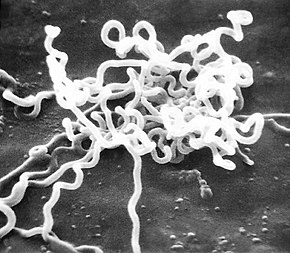| Rapid plasma reagin | |
|---|---|
 Treponema pallidum, the bacterium that causes syphilis | |
| Synonyms | RPR titer |
| Purpose | test to indicate a syphilis infection |
The rapid plasma reagin test (RPR test or RPR titer) is a type of rapid diagnostic test that looks for non-specific antibodies in the blood of the patient that may indicate an infection by syphilis or related non-venereal treponematoses. It is one of several nontreponemal tests for syphilis (along with the Wassermann test and the VDRL test). The term reagin means that this test does not look for antibodies against the bacterium itself, Treponema pallidum, but rather for antibodies against substances released by cells when they are damaged by T. pallidum (cardiolipin and lecithin). Traditionally, syphilis serologic testing has been performed using a nontreponemal test (NTT) such as the RPR or VDRL test, with positive results then confirmed using a specific treponemal test (TT) such as TPPA or FTA-ABS. This method is endorsed by the U.S. Centers for Disease Control and Prevention (CDC) and is the standard in many parts of the world. After screening for syphilis, a titer can be used to track the progress of the disease over time and its response to therapy.[1]
- ^ Morshed, Muhammad G.; Singh, Ameeta E. (2015). "Recent Trends in the Serologic Diagnosis of Syphilis". Clinical and Vaccine Immunology. 22 (2): 137–147. doi:10.1128/CVI.00681-14. PMC 4308867. PMID 25428245.